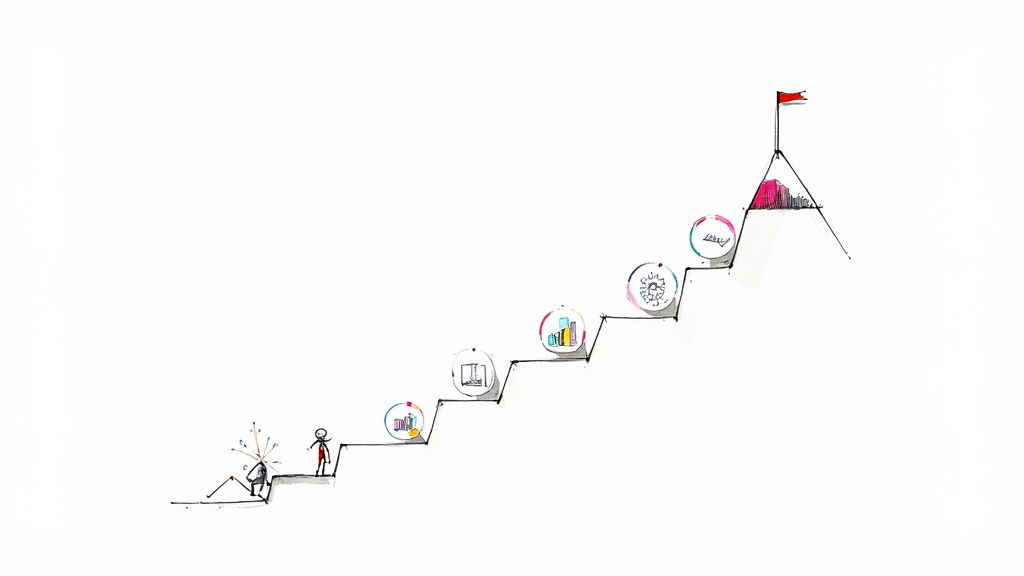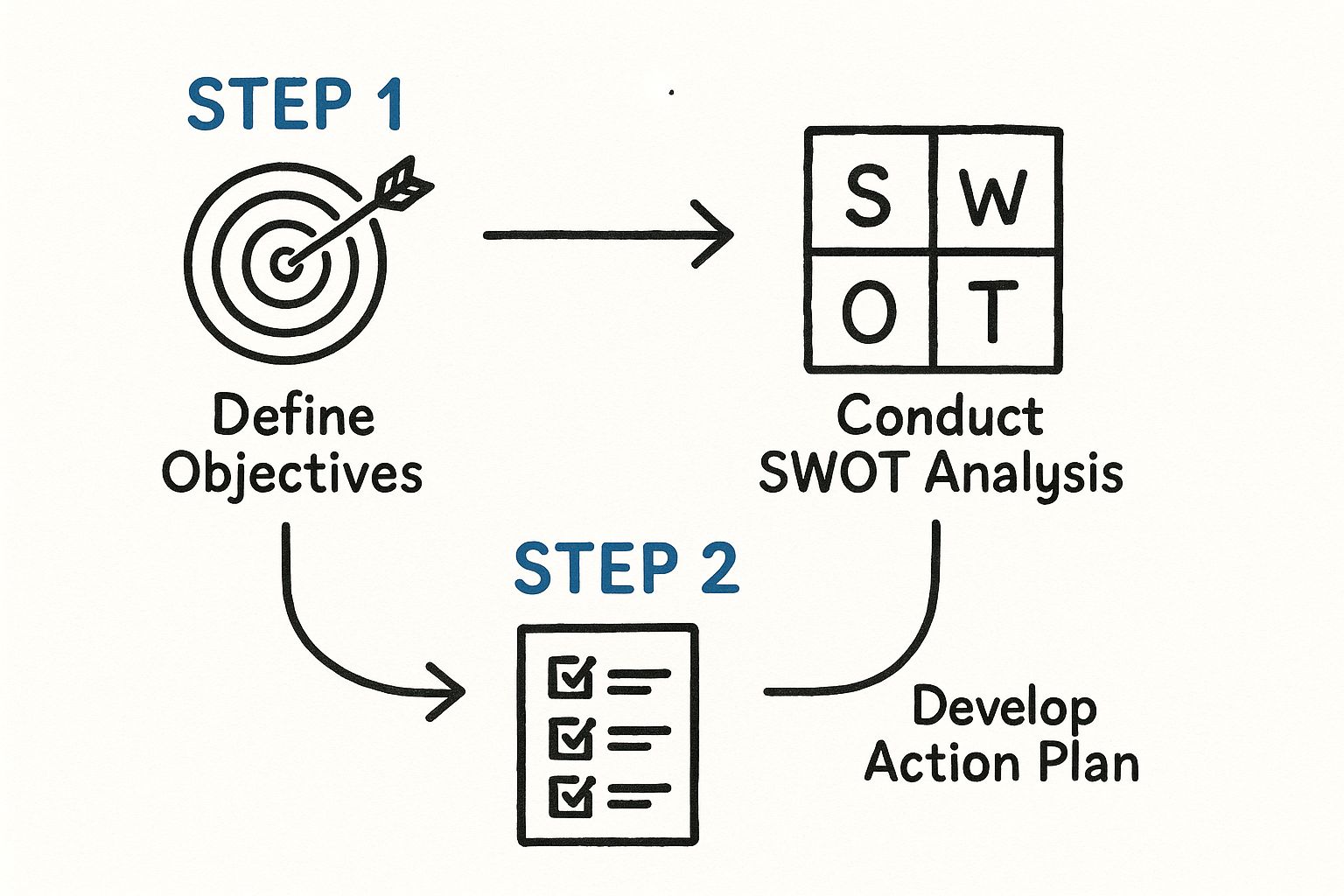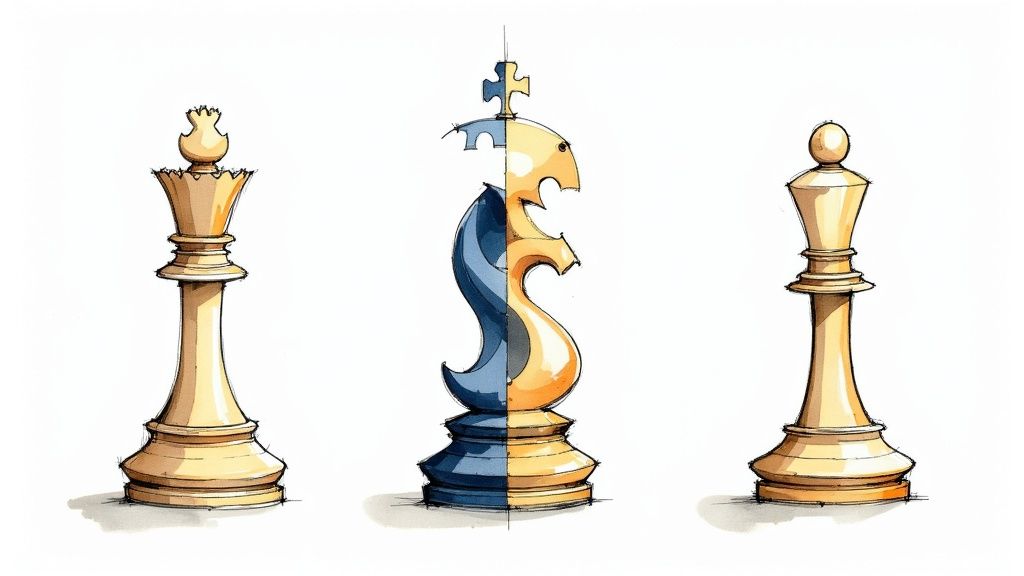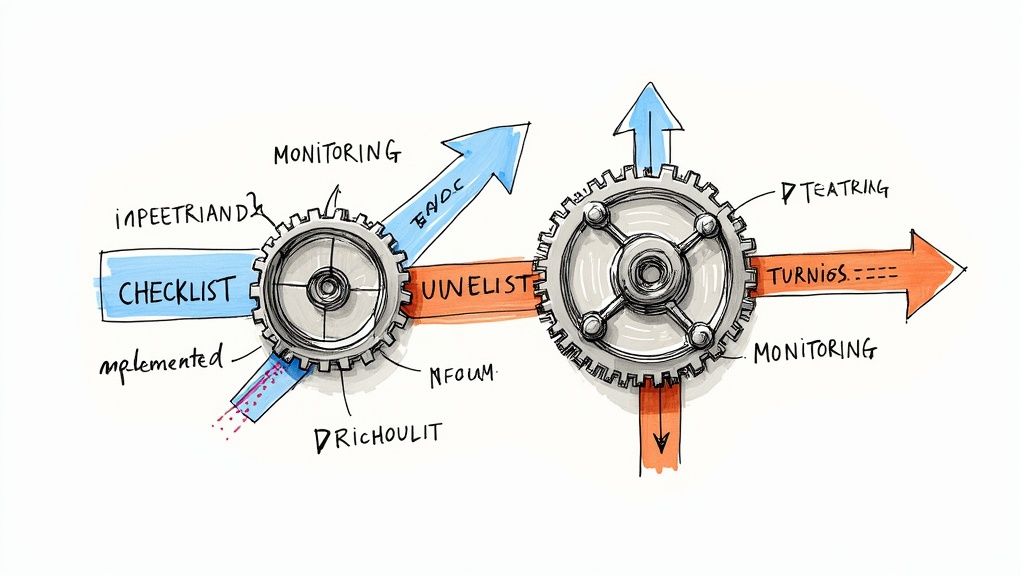A Guide to Business Strategy Consulting
Discover how business strategy consulting drives growth. Learn key frameworks, the role of AI, and how to select the right consulting partner for your company.

Think of business strategy consulting as bringing in a seasoned navigator for your company. You know where you want to go—that far-off island of success—but the journey is fraught with unpredictable currents, hidden obstacles, and competitors. A strategy consultant is the expert who brings the charts, compass, and deep-sea knowledge to plot the safest, most efficient course.
What Is Business Strategy Consulting

At its heart, this isn't just about giving advice. It's a true partnership. Consultants step in with a fresh, objective perspective to help you get crystal clear on your destination (your vision and goals), understand the treacherous waters (market dynamics and competition), and ultimately draw up a reliable map (your strategic plan) for long-term growth.
This table provides a quick look at the primary roles a business strategy consultant plays in driving business success.
Core Functions of a Strategy Consultant
Core Function Description Business Impact
Market Analysis
Conducting deep dives into market trends, competitor actions, and customer behavior.
Identifies untapped opportunities and potential threats before they become problems.
Strategic Planning
Facilitating the creation of a clear, actionable roadmap to achieve long-term goals.
Aligns leadership and resources around a unified vision and set of priorities.
Objective Assessment
Providing an unbiased, external view of the company's strengths and weaknesses.
Breaks through internal politics and "we've always done it this way" thinking.
Implementation Support
Assisting with the execution of the strategy to ensure it translates into tangible results.
Bridges the gap between planning and doing, increasing the odds of success.
Ultimately, their job is to ensure the brilliant ideas conceived in the boardroom actually come to life in the market.
Why Strategic Guidance Matters Now More Than Ever
In today's fast-paced business environment, having a solid strategy isn't a "nice to have"—it's a fundamental requirement for survival. Companies are under constant pressure to innovate, adapt, and perform. For many leaders, successfully navigating complex digital transformation challenges is at the top of the agenda.
This is exactly where a strategy consultant proves their worth. They help leaders answer the big, make-or-break questions:
- Where should we compete? Pinpointing the most profitable markets and customer segments to focus on.
- How will we win? Defining what makes the business unique and why customers should choose it over others.
- What capabilities do we need? Making sure the right people, technology, and resources are in place to deliver on the plan.
- How will we stay ahead? Creating a system for continuous innovation and improvement to maintain a competitive edge.
By offering unbiased analysis and a structured way to make decisions, consultants help organizations cut through the internal noise and rally everyone around a single, unified mission.
The Growing Demand for Strategic Expertise
The market itself tells the story. The global strategy consulting market is on track to hit around $60.3 billion in 2025 and is forecast to grow at a compound annual growth rate (CAGR) of 11.7% from 2025 to 2032. This surge is driven by businesses everywhere trying to improve sustainability, adopt new technologies, and become more cost-efficient.
This growth also signals a change in how consulting gets done. The classic model is getting a major upgrade from technology, especially Artificial Intelligence. AI is essentially giving the navigator a whole new toolkit, allowing for a more data-rich and agile approach to strategy. It can provide more accurate charts through predictive analytics and spot faster routes by analyzing market signals in real time. This evolution toward AI co-creation is helping businesses build strategies that are not just smart, but also incredibly resilient.
The Four Pillars of Strategic Consulting
Great business strategy consulting isn't some mystical art. It’s a disciplined process, grounded in a clear, sequential framework. Think of it like building a house—you don’t start with the roof and hope for the best. A solid strategy needs a strong foundation, and that foundation rests on four essential pillars.
Each stage flows logically into the next, turning raw data and tough questions into a real competitive advantage. This structured approach makes sure every decision is informed, every action is deliberate, and every outcome can be measured. It all starts with taking a deep, honest look in the mirror.
Pillar 1: Diagnostic and Analysis
The first pillar is all about Diagnostic and Analysis. At this stage, consultants are like business detectives. They don’t walk in with a briefcase full of one-size-fits-all solutions. Instead, their first job is to listen, observe, and gather evidence. This means a thorough investigation of the company’s health, from its financials and operational quirks to its market position and internal culture.
They'll dig in by conducting stakeholder interviews, dissecting competitor moves, and combing through years of performance data. The real goal here is to get past the symptoms and find the root cause of a problem—and maybe uncover a few hidden opportunities along the way.
For instance, a retail company might think its sales are slumping due to weak marketing. But a deep dive could reveal the real culprit is an inefficient supply chain that can’t keep popular products in stock. This phase is all about asking the right questions to make sure you're solving the right problems.
Pillar 2: Strategy Formulation
Once you have a clear diagnosis, you can move on to the second pillar: Strategy Formulation. This is where the detective work pays off. All the insights gathered during the analysis are pieced together to create a clear, ambitious, and—most importantly—achievable roadmap.
It's not enough to set a vague goal like "grow revenue." This is about defining exactly how the company will win in its market.
This means making tough choices. Where should we focus our resources? Which customers should we go after? What makes us different? For that retail company, the strategy might be to pivot to a direct-to-consumer online model, targeting a younger audience with a curated product line. This pillar delivers the "what" and the "why"—the very heart of the strategic plan.
The infographic below shows a simple flow for how you get from a clear objective to a concrete action plan.

As you can see, a clear objective and a solid SWOT analysis are the building blocks for a practical action plan.
Pillar 3: Implementation Planning
Let's be honest: a brilliant strategy is worthless if it just collects dust on a PowerPoint slide. The third pillar, Implementation Planning, is where the rubber meets the road. This phase is all about bridging the gap between a great idea and day-to-day reality.
The greatest challenge in business isn't coming up with a strategy; it's actually executing it. Implementation planning is what turns strategic intent into operational reality.
Here, the high-level strategy gets broken down into a detailed action plan. We’re talking concrete steps, clear timelines, assigned owners, and a realistic budget.
For our retail example, the implementation plan would map out specific tasks:
- Phase 1: Select an e-commerce platform and build the new website.
- Phase 2: Overhaul the supply chain to handle individual online orders.
- Phase 3: Launch a targeted digital marketing campaign to reach the new audience.
This detailed blueprint ensures everyone in the organization knows exactly what their role is in bringing the vision to life.
Pillar 4: Performance Measurement
Finally, we arrive at the fourth pillar: Performance Measurement. How do you know if any of this is actually working? This last stage is about establishing key performance indicators (KPIs) to track progress against your strategic goals. These aren’t an afterthought; they should be baked into the strategy from the very beginning.
For the retailer, crucial KPIs might include website conversion rates, customer acquisition costs, and average order value. By keeping a close eye on these numbers, leaders can make smart, data-driven adjustments on the fly—doubling down on what’s working and course-correcting what isn’t.
This creates a powerful feedback loop of continuous improvement, ensuring the strategy stays sharp and effective over the long haul. If you're looking to build your own strategic framework, you can get a head start with a Custom AI Strategy report, which provides a data-backed foundation for this entire process.
Key Frameworks and Methodologies Consultants Use

Strategy consultants don’t just walk into a boardroom with a gut feeling. Their recommendations are built on a solid foundation of proven analytical frameworks—a toolkit they’ve honed over years of tackling complex business problems.
Think of these frameworks as specialized lenses. Each one offers a different way to look at a company, its market, and its competition. They help cut through the noise, turning a messy, complicated situation into a clear, organized picture with actionable next steps. While there are countless models out there, a few have become the bedrock of modern strategy consulting.
SWOT Analysis: The Foundational Snapshot
One of the most well-known starting points is the SWOT Analysis. It’s the go-to framework for a quick but powerful diagnostic of a company's position by looking at Strengths, Weaknesses, Opportunities, and Threats.
- Strengths (Internal): What’s the company great at? This could be a killer brand, patented technology, or a hyper-efficient supply chain.
- Weaknesses (Internal): Where are the cracks in the foundation? Maybe it's outdated software, a talent gap, or a shaky balance sheet.
- Opportunities (External): What’s happening out in the world that the company can jump on? Think emerging markets, shifting consumer tastes, or a new piece of tech.
- Threats (External): What external forces could cause real trouble? This covers new competitors, tough new regulations, or a looming economic downturn.
A tech startup, for instance, might use SWOT to woo investors. They’d highlight their unique algorithm (Strength) and the growing market need (Opportunity), while also being upfront about their lack of brand recognition (Weakness) and the big, established players they're up against (Threat).
Porter’s Five Forces: Mapping the Competitive Landscape
While SWOT gives you an inside-out and outside-in view, Porter’s Five Forces zooms in exclusively on the competitive arena. Developed by Michael Porter, it’s a brilliant way to understand the power dynamics within an industry and figure out if it's an attractive place to be long-term.
The five forces in question are:
- Threat of New Entrants: How hard is it for a new player to set up shop?
- Bargaining Power of Buyers: How much leverage do customers have to push prices down?
- Bargaining Power of Suppliers: Can your suppliers squeeze you on costs?
- Threat of Substitute Products or Services: How easy is it for customers to find another way to solve their problem?
- Rivalry Among Existing Competitors: How cutthroat is the day-to-day competition?
Analyzing these forces reveals an industry's true structure. Consultants often pair this with other deep-dive techniques, like Value Chain Analysis, to meticulously examine a company's operations and pinpoint where they can build a real edge.
The BCG Matrix: Prioritizing for Growth
For large companies juggling multiple products or business units, the Boston Consulting Group (BCG) Matrix is a lifesaver. It’s a portfolio management tool that helps leaders decide where to place their bets based on just two factors: market growth rate and relative market share.
The BCG Matrix provides a visual map to help leaders decide where to invest, where to hold steady, and where to divest, ensuring resources are allocated for maximum impact.
It sorts everything into four simple categories:
- Stars: High growth, high market share. You pour money into these to fuel their rise.
- Cash Cows: Low growth, high market share. These are reliable money-makers that fund the Stars.
- Question Marks: High growth, low market share. The wild cards. Do you invest to turn them into Stars, or cut them loose?
- Dogs: Low growth, low market share. These are often phased out or sold off.
Supercharging Frameworks With AI
These classic frameworks are as relevant as ever, but technology is completely changing how they’re used. What used to take a team of consultants weeks of painstaking manual research can now be done with incredible speed and depth thanks to AI.
Imagine an AI running a full-blown market analysis in minutes. That’s where an AI Strategy consulting tool changes the game entirely. It can process colossal datasets to spot subtle trends, benchmark performance against hundreds of competitors, and run simulations of different strategic scenarios—tasks that were once too expensive or time-consuming to even attempt.
This level of insight is becoming essential. The global management consulting market, a massive industry that includes strategy work, was valued at around $1.02 trillion in 2024 and is on track to hit $1.33 trillion by 2029. With giants like McKinsey & Company pulling in $18.8 billion in 2024, the pressure to deliver smarter, faster results is intense. You can learn more about the top firms defining the space on aurorafinancials.com. Here at Ekipa, our expert team harnesses these advanced tools to provide world-class strategic guidance.
How AI Is Reshaping Business Strategy
The world of business strategy consulting is in the middle of a massive shake-up, and Artificial Intelligence is the one causing the tremors. The old-school methods of analysis and forecasting are being completely rewired. We're moving away from educated guesses and toward decisions backed by hard data. AI isn't some far-off concept anymore; it's a real tool that's making strategic planning smarter, right now.
This shift is essentially giving businesses a crystal ball. Take predictive market analysis, for instance. AI can sift through signals in the market to anticipate changes in customer behavior long before they actually happen. It can also automate competitive intelligence, keeping a tireless, 24/7 watch on what your rivals are doing and flagging threats or opportunities a human team could easily miss.
We're entering an era defined by AI co-creation, where leaders and intelligent platforms work hand-in-hand to build more agile and resilient strategies. Suddenly, top-tier strategic insight isn't just for the companies with the biggest budgets.
From Manual Analysis to Automated Insight
Not long ago, a huge part of a consultant's job was to manually dig through mountains of data, looking for operational weak spots. The process was slow, expensive, and you could only analyze so much. Now, AI does the same job with incredible speed and accuracy, finding inefficiencies that are basically invisible to the human eye.
This jump from manual drudgery to intelligent automation frees up consultants and executives to focus on what really matters: making the tough calls. Instead of spending weeks just gathering the data, they can spend that time debating the insights AI has found and coming up with creative ways to act on them.
AI doesn't replace human expertise; it amplifies it. By handling the heavy lifting of data analysis, it frees up strategic thinkers to do what they do best—innovate, lead, and inspire.
This is the new foundation for modern strategic services. For example, a Custom AI Strategy report can deliver in days what used to take months, giving you a clear, data-driven plan for growth. And as we've talked about before, AI-powered automation is what makes a great strategy actually work in the real world. You can learn more about how AI Automation as a Service helps businesses execute their plans with more speed and precision.
The Power of Predictive and Prescriptive Analytics
The real magic happens when AI goes beyond just telling you what happened and starts predicting what will happen. It's the difference between looking in the rearview mirror and having a GPS showing you the best route forward.
- Predictive Analytics: AI models analyze past data and current trends to forecast future outcomes with a startling degree of accuracy. A consumer goods company could use this to predict demand for a new product, making sure they have just the right amount of stock without tying up cash in excess inventory.
- Prescriptive Analytics: This takes it a step further. AI can actually recommend specific actions to get the result you want. It might suggest a price adjustment in one region to boost profits or tell you to shift your marketing budget to the channels that are actually delivering.
This kind of foresight cuts down on the guesswork and personal bias that can often sneak into human decisions. Strategy becomes less about gut feelings and more about statistical probability, which leads to faster, smarter, and more reliable outcomes. For businesses ready to build a more robust plan, our AI requirements analysis tool can help map out the exact data and tech needed for success.
Making AI Strategy Tangible
Applying AI to strategy isn't just a theoretical exercise. If you want to dive deeper into how this works in practice, this resource on AI Implementation Consulting is a great place to start. The whole point is to get tangible results and a clear return on investment. Modern AI strategy consulting is all about finding and implementing high-impact solutions that solve real-world business problems.
By looking at real-world use cases, companies can see exactly how their peers are using AI to get ahead. This practical approach makes the technology much less intimidating and shows a clear path forward. The goal is to move from abstract ideas to a concrete AI Product Development Workflow that turns a strategic vision into a scalable business advantage, a process skillfully managed by our expert team.
Choosing the Right Consulting Partner

Picking the right consulting partner for your business strategy isn't just another vendor decision; it's one of the most important moves a leader can make. You're not just hiring a brain; you're building a relationship. The best partnerships feel like an extension of your own team—a group that brings in a fresh perspective but still gets your company's DNA.
The market is crowded, to say the least. North America led the strategic consulting pack in 2023, largely thanks to rapid digitization and favorable government policies. In the United States alone, you're looking at over 1 million management consulting firms that pulled in around $370 billion in revenue that year. You can dig into more of these numbers over at fortunebusinessinsights.com. With that many choices, you have to know what you’re looking for.
Essential Criteria for Your Selection Process
Before you even start making calls, figure out your non-negotiables. A great partnership clicks into place when there's solid alignment from the very beginning.
First up, look for deep industry expertise. You need someone who already speaks your language and understands the unique pressures, rules, and competitive dynamics of your specific sector. This is how you get sharp, practical advice instead of generic business school theories.
Next, you need a verifiable track record. Don't get wowed by a slick slide deck. Ask for hard evidence and real-world use cases showing they’ve delivered real, measurable results for businesses like yours. As we’ve talked about before, theory is nice, but proof is everything.
And don’t forget about strong cultural fit. This is a big one. Your consultant will be working shoulder-to-shoulder with your leaders and your teams. If communication styles or core values clash, even the most brilliant strategy can fall apart.
Critical Questions to Ask Potential Partners
Once you've got a shortlist, it's time to dig deeper. The goal here is to get past the sales pitch and see how they actually work.
The right questions peel back the layers of a consultant's methodology, revealing whether their approach is built on substantive, data-driven analysis or just high-level theory.
Come to the conversation prepared with questions that really test their substance:
- How do you measure the ROI of your engagement? A solid partner will have a clear, no-nonsense way to define what success looks like and how they'll track it from day one.
- What is your approach to implementation and change management? A strategy on paper is worthless. You need to know they have a concrete plan to help your team adopt new ways of working. This is central to our AI Product Development Workflow.
- Can you describe a time when a project didn't go as planned? This question is a great test of their honesty, problem-solving skills, and ability to think on their feet when things get messy.
At the end of the day, you're looking for a partner who brings both powerful technology and genuine human insight to the table. At Ekipa, our expert team lives by this principle, standing behind our AI solutions to make sure they deliver practical, tangible value in the real world.
So, What's Your Next Move?
Hopefully, this guide has pulled back the curtain on modern business strategy consulting, showing you how we get from core principles to powerful, AI-driven execution. But knowledge is only half the battle. Now it's time to put it into action.
The best place to start is with a frank look in the mirror. Where are the real sticking points in your business? Are you wrestling with market positioning, are your operations holding you back, or is sustainable long-term growth proving elusive? Pinpointing these pains is the crucial first step. It's what separates a generic plan from a targeted solution that actually works.
Charting Your Course
A great way to get your feet wet is by exploring the concept of AI co-creation. This isn't about letting machines take over; it's a true partnership where seasoned human experts and intelligent platforms work together to forge stronger, more resilient strategies. Getting a handle on how this dynamic works can give you a serious leg up.
If you need something more direct, our AI strategy consulting services offer just that. We're not in the business of handing out abstract theories. This is about building a concrete, data-backed roadmap designed specifically for your business challenges and opportunities.
The best strategies aren't just dreamed up. They're built with precision, rolled out with discipline, and measured obsessively. AI is the catalyst that speeds up every single one of those stages.
From Big Idea to Bottom-Line Impact
A brilliant strategy is useless without a clear execution plan. Our AI Product Development Workflow is designed to bridge that gap, turning your high-level vision into a tangible product or service that's ready for the market. It’s a structured process that translates goals into a series of actionable steps, cutting down risk and maximizing your impact right from the start.
And remember, the tech is only part of the story. It's all powered by our expert team—a crew of dedicated strategists, engineers, and industry specialists who are genuinely invested in your success. They bring the critical human insight needed to tackle tricky problems and make sure the technology delivers real, measurable value.
The next step is simple. Let's talk. Reach out to our expert team, and we can start a conversation about your goals. Together, we can build a strategy that doesn't just let you compete—it helps you win.
Frequently Asked Questions
It's only natural to have questions when you're thinking about bringing in a strategy consultant. We get it. Here are some of the most common ones we hear from leaders, along with some straight-talking answers.
How Much Does Business Strategy Consulting Cost?
This is the big one, and the honest answer is: it depends. The cost can swing wildly based on how big the project is, the firm you work with, and how long they're with you.
A better way to think about it isn't just the price tag, but the potential return you'll get from a truly solid strategy. Modern tools like an AI strategy consulting tool are changing the game, too. They can give you powerful insights right out of the gate, often without the hefty investment of a traditional, full-scale engagement.
Is Strategy Consulting Only for Large Corporations?
Not at all. In fact, startups and smaller businesses often see some of the biggest benefits, especially when they're hitting a growth spurt, looking for investment, or breaking into a new market.
The trick is finding a partner who can be flexible. Today's AI-powered services have really opened the door, making top-tier strategic advice more affordable and accessible for companies of all sizes. As we explored in our AI adoption guide, the right strategic approach can be the key to unlocking growth, no matter how big your team is.
What Is the Difference Between Strategy and Management Consulting?
Think of it like this: business strategy consulting is a specialized discipline within the wider world of management consulting.
While a management consultant might help you with all sorts of things—operations, HR, IT improvements—a strategy consultant is laser-focused on the big picture. They help you answer the most fundamental questions: Where are we going as a company, and how are we going to win when we get there? That high-level strategic plan then becomes the roadmap for all other improvements.
How Long Does a Typical Consulting Project Last?
Again, there's no single answer. A focused project, like a quick market analysis, might only take a few weeks. A complete business overhaul could be a partnership that lasts months or even years.
For example, generating a Custom AI Strategy report is designed to deliver rapid insights in a shorter timeframe. On the other hand, rolling out a company-wide AI Automation as a Service solution is a much deeper, longer-term commitment.
No matter the length, the most important thing is to have a crystal-clear scope and timeline agreed upon from day one. That way, everyone knows what to expect. And throughout the process, you should be guided by an expert team focused on getting you real results.
Ready to stop guessing and start building a data-driven strategy? The team at Ekipa AI can help you uncover and execute your most promising AI opportunities. Get your custom AI strategy today.



